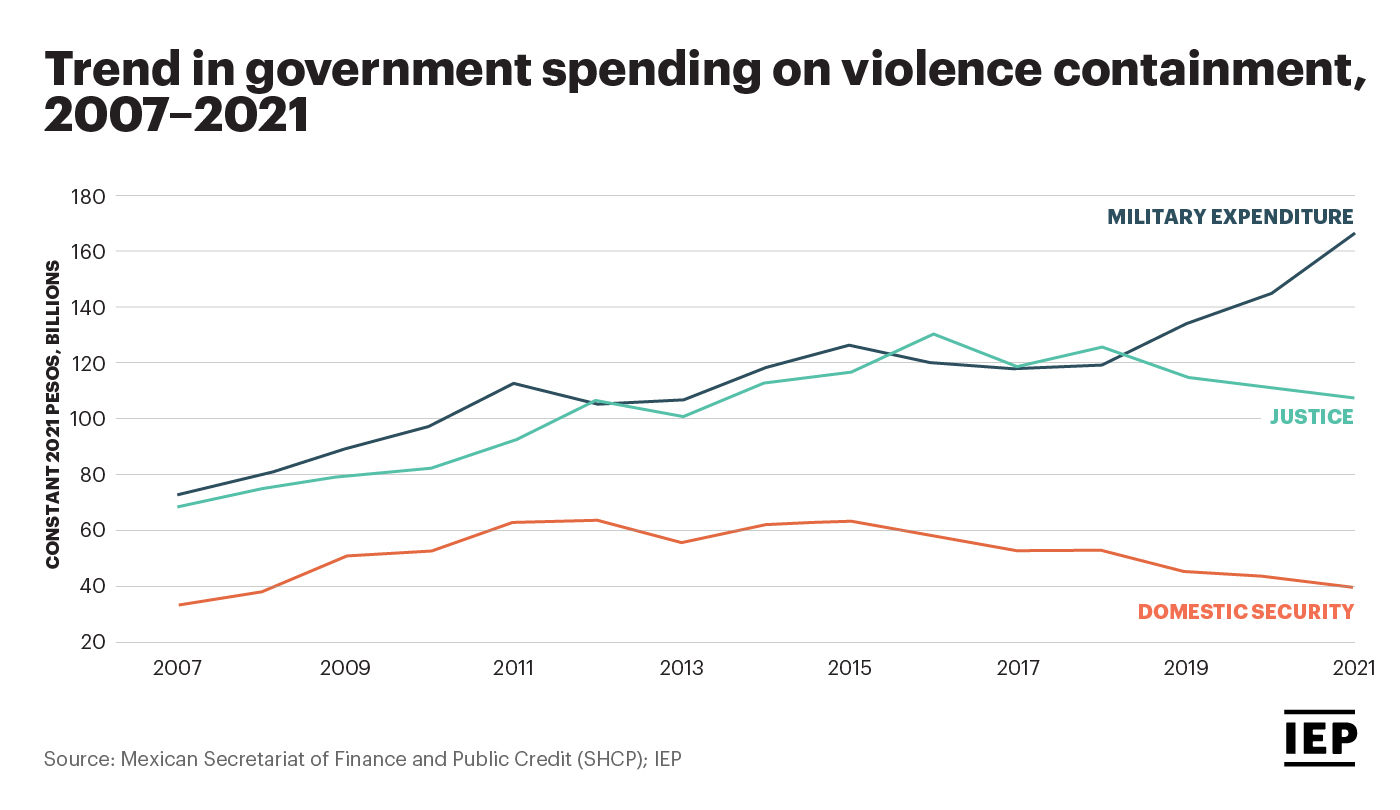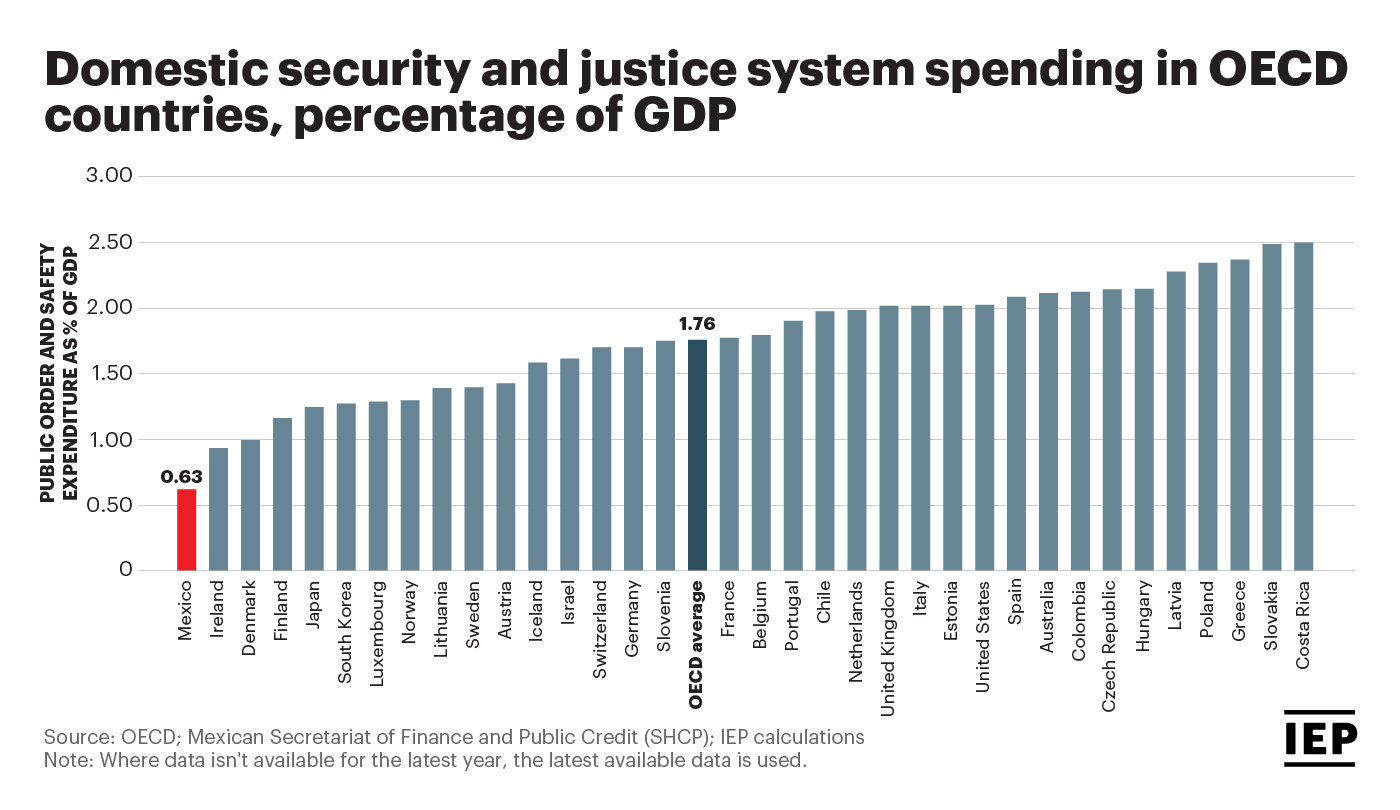In 2021, the economic impact of violence in Mexico was estimated to be 4.9 trillion pesos (US$243 billion), equivalent to 20.8% of Mexico’s GDP.
The economic impact of violence in Mexico improved for the second year in a row in 2021, decreasing by 2.7% or 137 billion pesos from the previous year driven by decreases in crime such as homicides, kidnappings and robbery underpinned the improvement in the economic impact.
Government expenditure on containing and dealing with violence accounted for 12.8% of Mexico’s economic impact of violence in 2021, or 633.1 billion pesos. Violence containment spending is comprised of the government expenditures on domestic security, the militaryand the justice system.
The figure below shows that government expenditure on the military, judicial system and public order and safety has increased by 78.5% since 2007, though the size of the increase has differed for each category.
Military expenditure increased by 127% since 2007 to reach nearly 167 billion pesos, the highest level of expenditure on record. In the same period, spending on domestic security and the judicial system has risen by 18.4% and 56.2%, respectively.

These differences suggest that Mexico is increasingly leaning towards a military solution to its internal security problem, particularly with the creation of the National Guard which combines personnel from the army police, the naval police and the federal police.
In four of the last five years the government has cut funding for domestic security and the justice system, while expenditure on the military has decreased only once in the last five years, accounting for inflation.
Mexico spends less on security, justice and public order, and domestic safety than regional and international averages. Mexico’s expenditure on the military is equivalent to 0.6 percent of its GDP, well under the global average.
Similarly, Mexican public spending on justice and domestic security are well below regional and international levels. Mexico spent 0.63% of its GDP on the justice system and domestic security in 2021, less than half of the OECD average.
A similar trend emerges when Mexican spending on justice and domestic security is compared with other Latin American and Caribbean countries. Considering the country’s high levels of violence, considerable gains could be made by increasing funding to match the OECD average.

Given the magnitude of the direct losses from homicide and violent crime, there is a strong argument for an increase in violence containment spending in Mexico.
The Mexican system has found it difficult to build sufficient judicial capacity to meet the demand. Consequently, Mexico’s justice system displays the need to increase the number of judges. Mexico has an average of 4.5 judges per 100,000 people. This is half the average number of judges compared to the rest of Latin America and nearly four times less than the global average. This deficit limits the judicial system’s capacity to process cases and creates backlogs of unsolved cases and persons incarcerated without a sentence.
By increasing the number of judges, the capacity of Mexico’s legal system may improve, leading to reductions in overcrowding in prisons and those incarcerated without a sentence. However, increasing the number of judges alone is not enough, and concerted efforts to reduce corruption in the judicial system and improve public trust are necessary.
In evaluating the efficiency and effectiveness of government spending on the justice and public security sectors, spending beyond an optimal level has the potential to constrain a nation’s economic development. This is because excessive investment on security would unnecessarily divert funds from other sectors such as education and health.
However, underinvestment can create conditions for higher levels of impunity, which in turn reduces deterrents to crime and violence. According to the Executive Secretary of the National System for Public Security / Secretariado Ejecutivo de Sistema Nacional de Seguridad Pública (SESNSP), there is approximately a 42% deficit of state police, a finding that supports the hypothesis of underinvestment in security.
With 1.02 police officers per 1,000 people, Mexico is below the international minimum standard of 1.8 police officers per 1,000 people established by the National Public Security Council / Consejo Nacional de Seguridad Pública (CONASP).
Limited public resources mean that an increase in spending on containing violence has to be funded by either increased taxes or reallocating funds from other sectors. These trade-offs are not easy to navigate and present an important policy challenge.
In Mexico, the lack of capacity in the judicial and security sectors leads to a security gap where the consequential costs of violence far exceed the containment costs. Therefore, achieving optimal spending on public security expenditure is important for achieving the most productive use of capital.
Download the 2022 Mexico Peace Index pdf report.